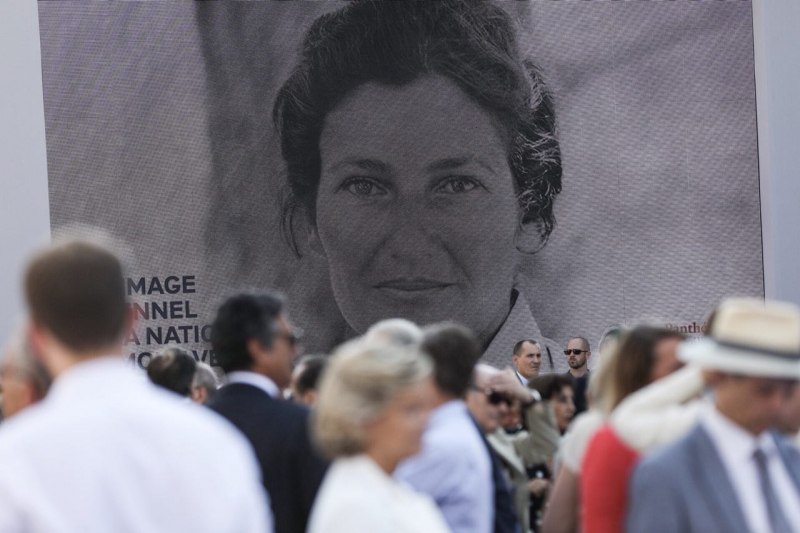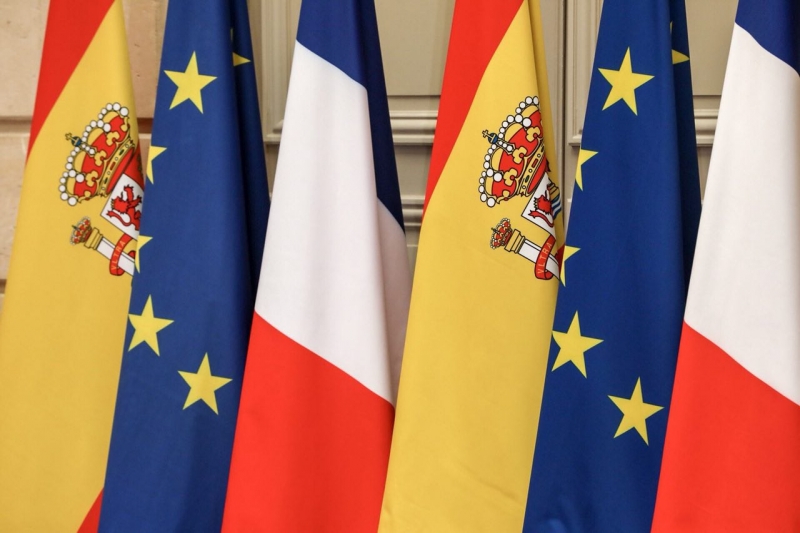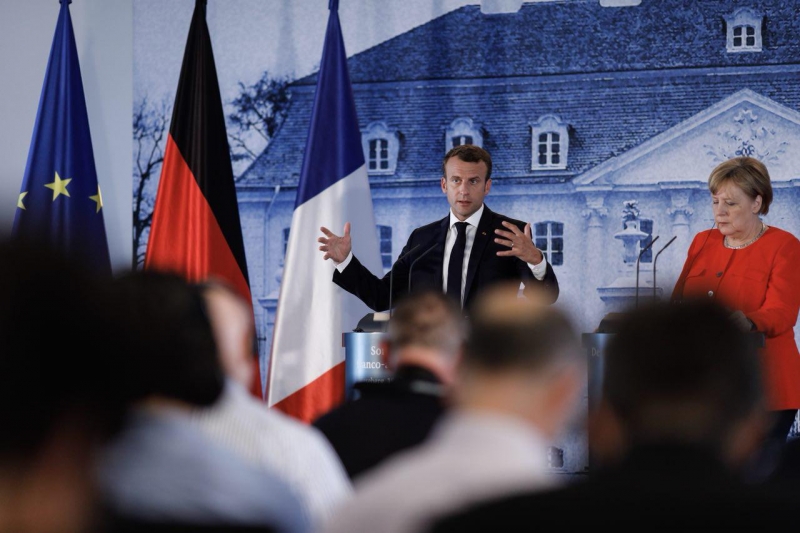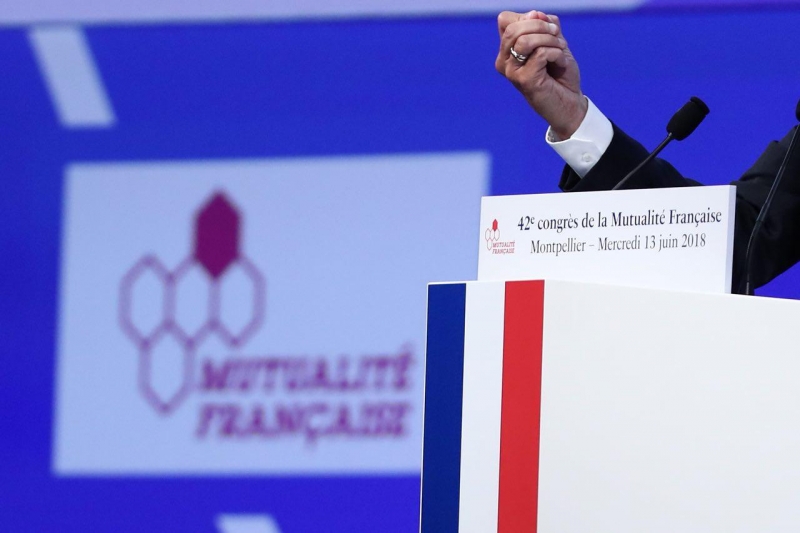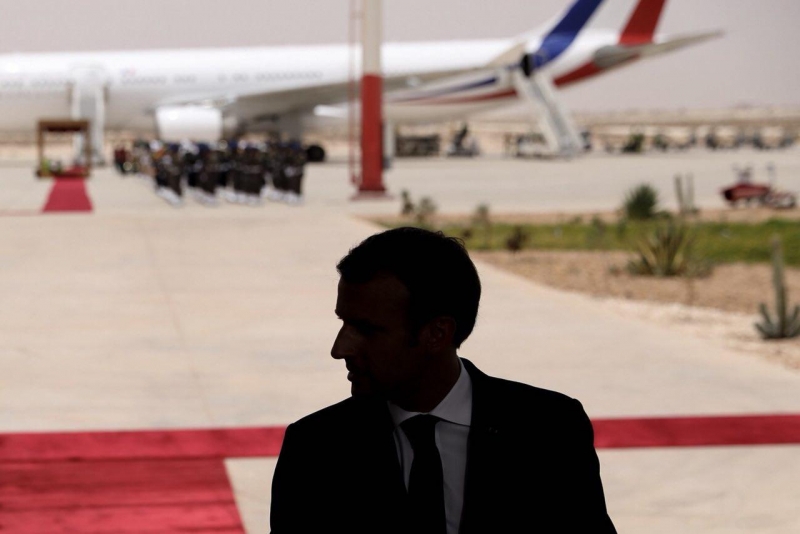MIL OSI Translation. Government of the Republic of France statements from English to French – Published June 14, 2018
Section: Health and solidarity
Only the delivery is authenticMontpellier – Wednesday, June 13, 2018
Thank you Mr President, thank you for this speech and your welcome, Mr President, Madam Minister, Ladies and Gentlemen Parliamentarians, Madam Regional President, Mayor, ladies and gentlemen.
Thank you Mayor to welcome us in this beautiful city of Montpellier, I understood that once a century, this city hosted Mutuality, and that it is the moment – it is not the only one – where the presidents come to express themselves, and there is a little more than a century, it is the president POINCARE which, in this same city, you found, proof if it were, that your movement is rooted in the history of the Republic and has always had that special connection, President, that you just recalled.
Social justice, solidarity, dignity, these are the republican commitments, and you have just now retraced, in some fundamental sectors, on some essential issues of our society, the importance of these commitments and these values, of course, we continue to promise every Frenchwoman and every Frenchwoman their fundamental rights. Of course, we continue to make a social protection system work which gives solidarity a universal dimension. But in fact, what we see is that every day the effectiveness of these rights is challenged, every day, many of our fellow citizens find that universality is fraught with exceptions, disparities, deadlock, that the situations or rights promised are not real rights, and they discover it too late, when the emergency is there, when the distress is there, when they need a foundation of solidarity national, they sometimes feel it, too often, to hide under their feet.
We live in a country where the republican promise is so often disappointed, because we have maintained the formal rights without worrying enough to make them real rights for everyone, at school, in the world of work, in the world of health, the French are viscerally attached to rights, but they too often realize that for many, they exist only on paper and more in fact; this is the French indignation contemporary. Yet, and this is a real paradox, we are devoting an ever greater share of our national wealth to social protection. So, yes, we can be proud of our system of social protection, it honors us, and it has, over the decades, responded to these indignations, the same which I immediately echo, but it would have, in a way, dispensed from a still more demanding effort, that of looking at the reality of our society in the face, the effectiveness of each of the rights, the folds of society, the obscure, cursed parts where these promised rights are lost, where these formal rights are no longer reality. A society that is increasingly secretive of destiny, of course, of opportunities, a society that excludes the possibility of recourse to entire sections of our population, a society that can not only redeem this political and moral bankruptcy by monetary redistribution, necessarily always insufficient. And this is the misunderstanding that I would like to start with this morning with you, I heard many commentators say "it will go before the mutuals and it will make a great social turning point."
But I'm going to tell you, I do not feel that when you get back on the economy, when you allow people to produce more, you're not against the social model, you're an example. alive, but it is to produce to redistribute, I do not feel that when we make the reforms of the school, college, high school, university made for a little over a year, we the enemy of justice, but the root of the evil is attacked. The fact that we have, for decades, been content with formal rights, strictly monetary redistribution, forgetting the inequalities of destiny, our system today is more unequal than 30 years ago on the academic level, on the plan for access to the most qualified jobs, be it the company or the senior civil service, our system is more deterministic than it was 30 years ago, it is a reality. And so to tackle the inequalities is to attack their roots, it's wanting to shake up a society that has become a society of status, it's wanting to recognize that all these challenges are not just monetary, it's wanting, in a way, to reinvent – but you'll hiss me at the end if you wish, but let me finish, especially since I do not see you – and it's knowing how to reinvent our welfare state, this one does not offer Too often as the last necessary safety net, which we will maintain, but it does not sufficiently guarantee the conditions of a dignified life. That's the fight I want for this five-year, dignified life! And a dignified life, that does not mean to promise to stay where we are born, it does not mean to promise to stay where we fell, it means to be able to choose at any moment where we can his life, and that means having a society that gives you the conditions of that dignity.
We have inherited a welfare state from the 20th century, and we must strengthen it, but we must build a welfare state for dignity and emancipation for the 21st century, and we need a collective organization of fraternity, which ensures the dignity of everyone, that is my main objective, it is that of the State, but you are perfectly right, it can not be alone, it is that of local authorities, which, all, are engaged in this action, regions, departments, metropolises, municipalities is the work of the social partners in contact with the real, the social every day. And it is that of all the social actors and these actors a little particular you recalled the history and strength that are indeed the mutualists, actors of national solidarity, committed to this cause which, you have recalled, all at the same time protect and act, have built through the centuries this ability to provide answers in terms of protection, but also to act on the ground, to offer care, attention, and I will not forget, in other times, the hours spent not far from Lorient, to Kerpape, seeing the work that had been done and the excellence of this one. But it is also the commitment, the time given on a voluntary basis in councils and in the action on the ground to change. It is the participation of your movement in the Republican project that will allow, with all the actors that I have mentioned, this radical refoundation that we need today. Our choice is simple, it is the choice between, in a way, two loyalties, that is, we remain faithful to a system that no longer meets the objectives of social justice that it had originally assigned, and which does not is, moreover, more in line with the expectations of our fellow citizens and the actors who do it. Either we choose together to be faithful to the values that unite us, to reinvent a system that makes the rights effective and concrete for all our fellow citizens. It is this second way with you that I will choose, it is more difficult, it probably takes more time, it is not settled simply by budget promises or commitments that will be held late. It implies our immediate action and it invites us collectively to give in to neither cynicism nor hypocrisy. The most precious part of our social system is the spirit that gives it birth. It is this visionary solidarity of the members of the National Council of Resistance who invented the system that is perfectly suited to a bruised people and a nation undergoing reconstruction. Our mission is to reconnect with this spirit, not to be afraid of change, because society has changed, and not to make us the vestals of a social order that, for 25 years, the evolution of the world, morals, society has come to shake its foundations and whose effectiveness it has come to undermine. We too could, after so many others, yield to the worship of totems, but I would always prefer effective social justice to incantations, and efficiency to fetishism. That is why, what we must do in terms of national solidarity, is a profound revolution that gives the French their rights, their dignity, their hope, and I will summarize it around three principles: prevention, which attacks the inequalities before it is too late, because it is both more efficient and more just, universality, which gives the same rights to everyone, in a transparent way, because it is the only way to rebuild trust in our system, dignity through help, accompaniment, presence, work as the key to emancipation for all who can access it, because that is what allows everyone to truly build your life. The solution is not to spend more money or to consider that there would be, on the one hand, those who believe in social transformation and who would align lines of credit, and those who do not believe it. and that would necessarily be to reduce the expenses. First, bad news, social expenses, you pay them, we pay them, and too often, in our country, we consider that when it is the State, it would be the other, it is us, even worse, it may be our children, when the accumulated deficit becomes debt.
The question is to look it in the face three major challenges on which I would like to come back, me entering in some way into your steps, and try on the basis of three principles, which I have just mentioned, to provide some answers, the health, age and exclusion. Health, things have been profoundly changed during the decades that have gone by, our system is in crisis, but it is not yesterday, the impatience is there, and it is legitimate, the suffering on a daily basis for women and men who every day care for those who cannot wait, those who suffer and those who call for an immediate response. And if we look in the face of our health system, it heals well, and we should be proud of, it is effective when compared to other large systems, but it prevents poorly, much less well than the others, it is without a doubt his first feature, however, if we prevent evil, we let our fellow citizens go to pathologies which are heavier and therefore more expensive, sometimes out of the company. Having a system that prevents better is at once better on the plan of the collective health and of the effectiveness of our system. It is this policy, carried out since several years by our predecessors, continued and intensified by the government, for example, in the field of tobacco, is in the process of permitting, with the first results which, gradually, will give in the time of their effectiveness
The second challenge we face is that of age, you have – and I will not return – perfectly described one of our collective successes, the success of our economies and developed societies, we live more old, and we also live older in good health. This obviously raises several questions for our collective organization that should not be ignored, the pension system can be totally unchanged in a society that continues to age and where the life expectancy – and we must rejoice – in the time after the active life, as we have thought until then, lengthens, where also the time of the studies lengthened before the active life. The chronology of our lives is no longer that of 20 or 30 years ago, the time of studies has grown, the time for relearning throughout life is taking hold, and the duration retirement is getting longer too. However, we spend a lot on our pension system, often more than our neighbors, but we have not, despite all the reforms of our predecessors, failed to fully implement the viability of this system in the long term, and most importantly, failed to rebuild the confidence of our fellow citizens over time. A very large majority of young people who are entering the labor market think that they will not have a pension, that their retirement will not be ensured by a system of intergenerational solidarity, this system of redistribution that I hold and which will be maintained because mistrust has established itself, distrust has also set in because we have 42 regimes, which, by sedimentation, have constructed the small differences, and with them, the small inequalities which may have been justified, but do they still have it? Most of the time, no. Because they have responded to a status society, but they no longer correspond to contemporary challenges. As you said, there are still real inequalities in old age, but often they do not fit with the statutes or the pension plans, because they correspond to quite particular, individual situations, related to the accidents of life, to the exposure to certain risks that everyone has known, and not to the status he has married at a time in his life and which he will change for the generation that comes to life today active. And so this system, which has gradually been designed over time and which responds to the challenges of a post-war, industrial, long-cycle society, is no longer suitable for an aging society, where the courses are more and more hurdles, where the courses are more and more individualized, and where the inequalities have become statutory. And our ability to respond to it will be the condition of collective trust in the system.
But the aging of our population raises a second challenge, as you rightly pointed out, that of old age, of dependence, a subject which at the same time upsets us, and which many of us would like to hold on to. away, our society does not want to see at the same time the great vulnerability, but also the place of death which, at a moment of this path, arrives. That said a lot of us, and I will not dwell on this point today, I would be too long, but the addiction is there, and this new vulnerable age of life is settling down. To not see it or to consider that it would be the business of a few, is not to treat ourselves with dignity, it is not to treat with dignity women and men who, once again, have the responsibility the daily lives of women and men who sometimes live their last hours, their last weeks, and of which they, those who care for them, often the last family. Our inability today to respond to this challenge has built social suffering in long-term care homes, in dependent persons or for their families, we must face this, it is a collective failure, and I wear it from where I am with the solemnity that must be mine. We will not solve it overnight, but we must face this changing society, understand it and consider that our response is not at the right height in terms of collective solidarity and that, because our fellow citizens older people are returning to nursing homes or institutions, they also need more and more early care, and that these establishments that were created to accompany a moment in life, where or could not stay in the family, are changing and become places where we also need a care to wear, a medicalization that does not exist everywhere or not enough, and therefore for which our response must be different and on which we must think a collective reorganization.
The third challenge facing us is that of exclusion, if we do not look at our poorest fellow citizens, if we do not look at this part of society which nation are we? I have often been criticized for being only for metropolises, sorry for Montpellier, for this France that succeeds, that for great people, etc., yes, I want to encourage them because if they can not do it there is no chance that the rest of society can get away with it, I confirm it. And so I want those who can produce, succeed hiring, do it even more, because I look everywhere around us, and putting a cap on success has never solved the problem of exclusion . But I say it, I repeat it and I will continue it tirelessly to do it, when those who succeed do not want to look at those who are left at the edge of the road, in what society do they want to live? As they watch the extremes mount around them, the hate speech ignites democracies. It is the fruit of selfishness and blindness. And so we must, while making our economy a stronger economy, more productive, while being the proponents of innovation, a revitalized economic force, also want to address the problem of poverty and poverty. exclusion in our society. And here too, let's face reality. We have in recent decades, spent more and more on this topic. And did we solve the problem? No. Did we warn him better? No. Have we changed the trajectories, allowed people to get out more? No. Have we better accompanied? Rarely. When I look at the figures today, the reality is that we have many devices, but children born in poverty are still too often and determinism has become established. Today the face of poverty, what is it? One in five children, one in three single parent families. This is the face of poverty, it is plural, it is diverse, it is not a big whole in which one could somehow include a static part of the society that is ours. We have created a system that has progressively become the dehumanized state. It was thought that the answer to exclusion and poverty was money. We have, in the last ten years, increased the RSA by 80%, but we have reduced support by 40% in terms of expenditure. This figure says it all. Today we have 50% of those who are at RSA, who after four 4 years are still at RSA. We have 30% of women and men who do not, who do not go to the benefits that are promised to them, because they are too complex or stigmatizing, and therefore we have a system that prevents badly, stigmatizes and is too complex, which is not very humane and which does not allow those who fall into it, who fall into these situations of exclusion or poverty, to get out of it as quickly as possible, to find their full place in the society. And here too we must, with all the harshness of the statement I make, and I do it for myself, this observation I make for us, I do not do it for those who are in these situations, because that they are the first victims, because one does not choose one's situation, but if we do not face the reality of our own, and the failures of our action, how can we answer it?
On these three major challenges: health, aging and exclusion, we are here. So, the solution is to tackle in my eyes the problem at the root, the dysfunctions of a social system too focused on the actors and not enough on our compatriots, to have more prevention, more support, more of collective responsibility of each of us, and try to bring, by a profound transformation that will take time, which is perhaps less staggering than money put on the table, but I am sure much more efficient, because it will go with investment in certain public policies, and indeed of the expense that we will assume, but also of the transformation and the savings which will have to know how to make on the useless parts of the expenses which I have just described.
This collective transformation, I want us to lead it together on the three challenges I just mentioned. On health first and foremost, we post a total dependent burden on health expenditures of around 8.5%. But what is the reality of this system for those who have a little less money, a little less access to practitioners, a little less habits also to consult regularly? And on the basic services that make everyday life, what is the reality of the system? If we want him to better warn and treat better close to the field, and as soon as possible realities. This is the rest of the charge for dental prostheses, today is an average of 43%, which means on average 200 € for a crown, it is 22% on optics, which is on average, even if the differences are very important in his sector, 65 € for the correction of myopia. It is 53% on hearing aids, that is to say 1,700 € on average, to be equipped. I'm talking about the rest of the charge. Does this mean that many of our fellow citizens, who have simple pathologies, have to give up treatment? But what does that mean very concretely? Because we put our words that are sometimes a bit technical. That means that the possibility of smiling, seeing, hearing, sometimes eating normally, our fellow citizens, who because of the rest of the charge does not have access to these prostheses, are deprived. This means that behind them are children who can not read at school as they should, since the ability to wear glasses is one of the main causes of poor learning and learning. Illiteracy at the end of primary school. This means that some of our fellow citizens, who are excluded from work, can not come back to work because they can not afford to heal their teeth or because they can not afford to fix their teeth. a hearing that has become defective means that our older citizens, when they begin to lose hearing and can not afford to correct it, will fall more quickly into dependency. Sorry to be concrete, but that's it. And behind what I describe concrete situations, which are more prosaic than our words that sometimes protect the reality, it is each time individual dramas, it is this inequality of trajectory of which I spoke to you. It does not seem anything, but after a while, it becomes irrattrapable. So yes, we need to intervene sooner, faster, more massively, it's the best way to fight against inequalities, and that's what we did, with the rest being zero-load or 100% health. The profound transformation that we have undertaken, will certainly be presented first in its financial aspect, it is real and it is obvious that to allow all those who hitherto could not, for monetary reasons, benefit from auditory, dental or dental care. optics is an essential social conquest, and it is an investment that I assume, an investment that we are going to share together, and which will make it possible to reduce this burden to zero.
[Arrests of the room on lower taxes]
THE CHAIRPERSON: So, for everyone to be clear, I think that the two arrests are convergent, it is the proposal to return to the taxation of the sector, to allow it to invest more. I will be perfectly clear: the agreement built through the involvement of all, and I really want to thank you for it and the work and commitment of the minister, is independent of these measures. So if we go in that direction, I'll ask you more, but I'm ready to open that discussion. But, I would not want us to be misunderstood because the agreement reached is not subject to a reform of the sector's taxation. Now I am ready to open a discussion on the taxation of the sector, so that together we can do more and be more effective in the engagement of the sector. And that, you will always have with you if it is necessary to go in a system of common sense on which you call me. I'm coming back, but I would not want this improvised dialogue to get in the way that I was denouncing, where the state would discuss with the mutual sector, forgetting that behind it are our fellow citizens and their interests.
So back to our dentures, optics and hearing and their reimbursement. The logic behind this fundamental advance is, as I said, a monetary one, but it is based first and foremost on an increased use of care. This is to prevent that the pathologies concerned become more serious, more disabling, and for this, it is to significantly strengthen prevention, particularly among the youngest, with systematic screenings, and that's it for me, what you have collectively managed to negotiate in recent months and that is essential. We will put in place screening for visual and auditory disorders, reinforced at an early age, with three new consultations of the attending physician or school. To reduce the use of dental prosthetic care, we will introduce a test for 3-year-olds, but also for 24-year-olds. This is prevention, it is to ensure that, at the earliest, for our fellow citizens, there is access to consultation to see if there is a need for care, or there are behaviors to change. And this is part of the agreement, and that too is interesting for mutuals, for professionals, for the State, because by instituting these consultations at the earliest, we warn better and therefore we will spend less. This prevention, it also goes with an accountability of all professionals, and the revalorization of certain acts. This is the coherence I want to emphasize here, the agreement that has been reached. For example, for dentists, the fact of greatly increasing the value of conservative care, because professionals today were not well paid for this care, where they were essentially making their income, which was legitimate, on more serious acts. late and more expensive for our fellow citizens, as for the community. But we must also be responsible, we want dentists who can live well in their profession, who can continue to settle and therefore the collective choice that is better to pay for conservative care, goes in this direction, and also allows have a much more consistent approach to healing.
The other part of the prevention revolution will be based on easy access to health professionals, because the full reimbursement of the glasses, essential, is useless if it takes 12 months to have an appointment with an ophthalmologist. And so for that, we will go further in the organization of professional cooperation. The profession of dental assistant will be expanded, we will go further in the training of opticians and increase the number of hearing care professionals. It is a set of the organization of the professions to which we must go. But what I want you to touch here, through this reform, is that we will, by the collective commitment, by the illustration of what you called your wishes Mr. President, is it- to say the commitment of the State, the commitment of mutuals, insurers, all health professionals and those who provide precisely the protection, the commitment of the social partners and health insurance we have found an intelligent solution that allows one hand to have an answer in terms of purchasing power, we will spend 1,700 € to zero, 200 € to zero, 65 € to zero! So it's purchasing power for our fellow citizens. We will allow better prevention and we will allow an organization on these three professions of the care system, much smarter and that responds to the challenges that it has just described. And so, you have on these three topics, collectively, been able to bring an answer to the challenges, to the stalemate in which we were until then. Purchasing power, prevention, better services because better collective organization of care. We have for this, as I said, and that is why I also wanted to thank you, need the commitment and responsibility of all. And you are the example, ladies and gentlemen, on the 100% health of this commitment. The compulsory health insurance will contribute to the financing of the reform, by doubling its support for hearing aids for adults by 2022, but alongside the compulsory health insurance, the complementary organizations that you represent, have also committed to taking their part in the coverage of this 100% health basket. Complementary health care contracts, which ensure more than 90% of the French, will have to cover this basket. And of course, this reform can not generate a specific increase in the cost of acquiring a complementary health insurance for the insured, it is the collective commitment that we took and there is not in this business, of dupes market. And I saw the nascent polemics, not on this agreement but on the past, the increase of some complementary, it is the commitment of the collective responsibility of the actors which makes it possible to control the costs, what you knew how to do in several sectors. It is also the complete transparency, the healthy competition organized that avoids practices whose first victims are our fellow citizens. This is your commitment here, and I thank you and I count on you to succeed this challenge to be at the rendezvous that the French will expect concretely for full implementation, over the next three years, since this reform will be finalized by 2021. So yes, we must intervene earlier, faster, more massively, by mobilizing all. This is the best way to address health inequities, which I mentioned earlier. And we have also invested considerably, in this area, we are as I said, legitimately proud of our health system, the performance of our hospitals, but there are also situations of failure on which I came back.
To meet these challenges, we must also, for the hospital, for all health professionals and for our fellow citizens, who use our health care system, succeed in providing a more appropriate response and transforming our historical model. We are faced with considerable disparities, a maladjustment of this model, oriented towards an individual and curative approach to acute care, as I said, as new needs for prevention and long-term care emerge, with chronic diseases, with aging. If we want to privilege quality and prevention, we must also, beyond this first agreement obtained, lead a reorientation of the organization of the care system, to treat pathologies very early, in order to rethink our collective organization . We need to move progressively from logic, care supply management, overly rigid mapping, from an overly numerical and budgetary approach, to a logic of demands based on the services to be rendered to the population on the territory. on their pool of life, and a logic more individualized, that is to say turned towards the patient. To meet these needs for local care, the actors must organize themselves in networks, decompartmentalize the city medicine and the hospital, also guaranteeing access to at least five services, access to a doctor. Permanence of care and access to unscheduled care, continuity of care, gradual care, screening and vaccination. And beyond these five minimum services, we must build this medicine, which will be patient-oriented and that will allow it, which will allow, sorry, to build its path in the health system, and at every moment to protect it the best. I do not want to speak about work that has not been completed, the minister is continuing the consultations, and we will have the opportunity to come back in the summer, and I will speak to the minister. summer, at the end of all these consultations. You will also have some responsibility to take, ladies and gentlemen, in the transformation of the health system. The role of complementary insurance is not always limited to the reimbursement of care, you are health providers yourself, not just payers and therefore you know the intimacy, if I may say, of the complexity that I just recalled from health care services to health centers to long-term care homes. And the mutualist spirit is also helping to build care pathways in sometimes isolated areas, for the benefit of the most vulnerable patients, to invest in prevention, to cooperate with professionals. Basically, you have in your genes part of the answers we want to bring to this contemporary challenge. And so, as you can see, on this subject, we will have in the summer, to take a position there too on a profound transformation, which is not just a monetary subject, but which will involve a profound reorganization, and which will involve also to review all the structures to which we have been accustomed since 10 years, from the pricing to the act, the pricing to the activity, the sacro-holy summa divisio, between a city medicine and hospital medicine, and it will also be necessary to return to habits, so that all those who take care, can take all their responsibilities.
The answer to the second challenge of aging, and it will be on this point, faster, it is also indispensable. You mentioned it for the first point that matters to me, that of preventing. We must, and this will be at the heart of the pension system that is being built, under the authority of the minister and whose consultation is ongoing, we must better prevent, and therefore throughout life, to encourage employers, to encourage the whole community, here too, to prevent so that everyone can age better and that the inequalities are gradually smoothed, in front of old age. And we need to take into account all the disparities in the pension system, as we are building it. It is then necessary to bring the answers of solidarity, not negotiable, it is moreover what had been the object of my commitment for the minimum old age, which increased from 30 € per month to the 1st of April last and which will increase to the 1st next January 30 €. And I hear murmur in the room, few people at least old age who pay the CSG at full rate. So these are people who have only gained purchasing power. No, but it's a reality. But it's a reality, it's important not to allow misunderstandings. Anyone with a minimum of old age or who has a modest pension, pays a CSG, which is quite normal, and the choice was not to move it, which is a CSG at the reduced rate, I would not suggest that people whose minimum old age has been raised, would have a CSG that would have increased. On the old age, the answer, and therefore on retirement, the answer is obviously the complete overhaul of our pension system, with principles that I want here too clear and simple. I want us to be able to maintain our pay-as-you-go pension system and intergenerational solidarity. It is the choice that has been made, it is the choice that has been made, on which I am committed and it is the solidarism that is at the heart of our Republic. Simply, this complete solidarism, it also goes with the end of a status society, and so it goes to a system that we are building, negotiating, concerter, which will allow a euro contributed to give the same amount of rights. And so that we gradually converge all the existing regimes, which had been built into differences that have become inexplicable today. That's the key to establishing what? On the one hand, the justice of the system in the long term, having a transition period that we assume and also allow confidence in the system, so that everyone can read, immediately, know his rights and for them know that his rights to a € 1 contribution, are the same as that of the neighbor. This is the key to responding to the collective mistrust in which we have settled, and also to meet the challenges of aging, which I recalled a moment ago. On this subject, a law will be presented at the beginning of the year 2019 and will be voted in the first half of the year 2019. The decisions will be taken, they will be clear, a transition time will be granted, and we have chosen, fundamentally, not to make an umpteenth budgetary reform privileging the short-term, to finally make the reform that allows to put flat the building, to recreate confidence and justice, accepting a long tradition.
Speaker: (Inaudible)
THE PRESIDENT: But you are absolutely right, we are in a free inquiry hall, but I like that. On this subject, on this subject, you are absolutely right, we must not forget women, forget about broken and fractured careers, forget about women and men living with disabilities, nor forget the situation of great difficulties. and inequalities in socio-professional risks, and so it is also all that a transparent system will integrate into the parameters and which will be transparent, concerted, negotiated and voted by Parliament. So you are absolutely right.
Finally, on old age, it is obvious that we can no longer delay the answer to be given in terms of dependence. I mentioned earlier the reality, the daily life for many of our fellow citizens for caregivers, for those who share these often dramatic realities. On this point, we also need this, while preventing better to mobilize all the actors, to recognize the part of the family solidarity and to give it a status and a place. The share of collective solidarity, social, finally build the mechanisms responsible for funding and finally agree to have the necessary national debate, which will meet this new risk, which is there and which we need so reply. We know the first estimates, 9 to 10 billion euros tell us some. We also know that the answer is in a mobilization of all the actors, it is in the innovation, it is in the capacity to give a place in the society and to better recognize and remunerate the work of those and those that accompany the dependents, and to ensure the transformation of the establishments, in establishments more medicalized than they are today. This great transformation, it will not happen, either, overnight, the minister has brought a few weeks ago first essential and urgent answers. I know that they do not fully respond to the suffering of those who work in these institutions. I know that they do not fully respond to the indignation, legitimate, of many of our fellow citizens. We will not fix it overnight, I'm not going to make you cookie promises, podium promises, and it's not just a financial commitment, it's going to be there, because we need to invest on this topic. No, we must build a new risk, we must respond to this new social vulnerability, which is dependence. On this subject, the year 2019 will also be devoted to a law that will be passed before the end of the year.
Invest more in people, accompany them so that they regain their dignity whenever they can, and accompany all those who can return to the work towards it, because the emancipation is built by the work as soon as we can, there will always be those who can not, and we must protect them, and be there, and take care of them, and recognize their part in our society, but all those and those who can, be accompanied to do so, and allow our public policies, our collective commitment, and your commitment as well, to be the path of accompaniment and empowerment that enables emancipation in and through work. Because if all those who can do this way do not do it, we will not legitimately have the means to go to finance the legitimate risks and the great vulnerability that I evoked just now. is not true, and we also have to face it, because otherwise we would be lying to each other, and all those who would not want to change anything, who in a sense consider the technological frontier of social justice, would spend more by not empowering anyone, tell me who finances in the end? Always someone, you or your children or those who are not yet born. And so let us make this work of transforming our social policy, by providing this support, by also transforming this place of social work, and for me, this transformation is indispensable if we want to succeed in this path that I evoke. And that's also why what we are doing to enable this emancipation, is to build, at each stage of life, the new individual security, the new securities are no longer status, it is not is more in the society of tomorrow neither unemployment as it existed, nor the RSA, it is the possibility at every moment of life to be reformed, reoriented, to be both protected and accompanied for to be able to emancipate at any moment by this work. The heart of the law that is coming to Parliament right now on the transformation of apprenticeship and skills training is that, and it's a continuum, from great poverty to life all the way through. job. What we need to do is reinvest in the person, it's more support, more empowerment, and not the only answer is the community's money for personal situations. become impersonal. We must go out on all these topics of a logic of window for a logic of accompaniment.
Here, ladies and gentlemen, what I wanted to tell you about these three challenges. I will come back in the coming months to both poverty and health. But I fully embrace this discourse of truth, of collective responsibility which makes me, in my view, the answers to our contemporary challenges can not be the solutions of yesterday, because they did not answer to these challenges and because they have leads to what? To spend more and more, each time responding a little less to the daily reality. What I want together, we can rebuild, inspire deep values, which are yours, which are those of the Republic, which are those of the spirit of 45, is to face the society that is ours, a society made of ruptures, great transformations, great anxieties, this aging that we have long discussed, so that the heart of our response is better prevented, or to re-humanize and to accompany, not to help live in sickness or to live in poverty, but to help get out of the disease and out of poverty.
And to empower all actors, to ensure that everyone in this society should not be treated as being in a state of social or intellectual minority, but that everyone has a part of the solution. So yes, Mr President, to succeed in this transformation, I do not think for a single second that the state can do it alone, I deeply think that this transformation will now be a matter of decisions, acts, details, will be a daily work of the day, where the State will have to take its share of responsibility, but where all the actors, who make the national solidarity, will have to learn to reinvent their role to think these challenges and to participate in this transformation. From that, I know you capable of that, I know we are capable. Long live the Republic and long live France.
EDITOR'S NOTE: This article is a translation. Please accept our apologies should the grammar and / or sentence structure not be perfect.

